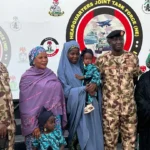In the span of 10 years since Boko Haram’s numerous attacks on various communities in Borno State in the North East, many lives, jobs and industries have paused, restarted and stagnated again. One of such industries continuing to sway between hope and despair is the leather industry. For many small scale tannery owners, it is a struggle. One of such owners is Alhaji Babagana Adamu.
 Standing next to the leather he produces through a rigorous handmade process, Alhaji Babagana is occasionally oblivious to the acrid stench in the air. ‘I have been doing this for thirty years’, he says in apology as he glides through drying animal hide in the surrounding area. Founded almost fifty years ago by his father, the small tannery tucked away in a busy neighborhood of Lamisula in Maiduguri, had been successful for many years.
Standing next to the leather he produces through a rigorous handmade process, Alhaji Babagana is occasionally oblivious to the acrid stench in the air. ‘I have been doing this for thirty years’, he says in apology as he glides through drying animal hide in the surrounding area. Founded almost fifty years ago by his father, the small tannery tucked away in a busy neighborhood of Lamisula in Maiduguri, had been successful for many years.
His home, a section of the tannery, is next to the holes dug in the ground for dyeing animal skin. “This is the trade we were born to, it is what our children and grandchildren are working on and learning to continue”, he elaborates. The backbreaking often dirty job required to produce the leather in the tannery is an everyday activity; many young men are seen bent oiling or seated scrubbing the hide whilst others dry it.
 The process he pauses to explain is a tedious, traditional and age old procedure. With animals arriving from countries like Sudan, Niger, Chad, Central African Republic, the skinning takes place in his backyard after the slaughter of the animals in select abattoirs within and outside Maiduguri, the state capital of Borno. With the hide meticulously preserved with salt by sellers, the animal hide arriving at Alhaji Babagana’s tannery is soaked, vigorously cleaned and undergoes varying types of processes to become rid of unwanted raw skin and hair. It is oiled delicately in the end.
The process he pauses to explain is a tedious, traditional and age old procedure. With animals arriving from countries like Sudan, Niger, Chad, Central African Republic, the skinning takes place in his backyard after the slaughter of the animals in select abattoirs within and outside Maiduguri, the state capital of Borno. With the hide meticulously preserved with salt by sellers, the animal hide arriving at Alhaji Babagana’s tannery is soaked, vigorously cleaned and undergoes varying types of processes to become rid of unwanted raw skin and hair. It is oiled delicately in the end.
The product that emerges is a glistening leather sold to many merchants. “We have many customers who buy from us. We sell to buyers directly or sell to dealers who have interested people in fashion; many of the tanned products can be shoes, belts, bags. We even have customized ones for horses. Some are dyed red, others are black. Some people prefer plain”, he emphasizes.
 The lack of proper footwear, appropriate clothes and other gear for the workers is however evident in the tannery. As an employer, Alhaji Babagana acknowledges the impact his job is having on his employees and neighbors. “We wish we had a better location to operate from. We are located right in the middle of the neighborhood and I feel guilty that we pollute their air with these toxins and it’s smell”.
The lack of proper footwear, appropriate clothes and other gear for the workers is however evident in the tannery. As an employer, Alhaji Babagana acknowledges the impact his job is having on his employees and neighbors. “We wish we had a better location to operate from. We are located right in the middle of the neighborhood and I feel guilty that we pollute their air with these toxins and it’s smell”.
A remorse rare for many manufacturers, he sits dejected not about only the environmental effects. He worries about the future of the business itself. “We are not what we used to be. We relied heavily on local government areas but there’s no access now. Our strength was the villagers. But we haven’t stopped. We are able to feed ourselves. Our children aren’t idle. It is what prevented them from joining the terrorist groups in the heat of the crises”, as his eyes gleam with pride.
The economic impact of Boko Haram on many businesses in Borno State is unprecedented and has taken a toll on many communities. A previously bustling economy with links to the three neighboring countries of Niger, Chad and Cameroon, the leather industry raked in millions across the region and abroad. In this tannery, the drastic drop in sales has affected Alhaji Babagana’s life. “In the oral histories told by our parents, it was one of the most thriving businesses in this town. We had at least ten tanneries in this area and around fifty different ones in Borno. Now, we are the only remaining one in this neighborhood”, he reflects in a somber tone.
On the other side of town, there are many plans to revive industries. As the Borno State Government enters a rebuilding stage for industrial manufacturing, many small tanneries are keen to be included. Alhaji Babagana’s hope is to be moved to a location where family owned tanneries can also fully function with protective gear without harming the neighborhoods.
 “We truly hope our leaders are listening to us and the problems we are having in this business. We hope there will be help from the government. We know they have the money”.
“We truly hope our leaders are listening to us and the problems we are having in this business. We hope there will be help from the government. We know they have the money”.



